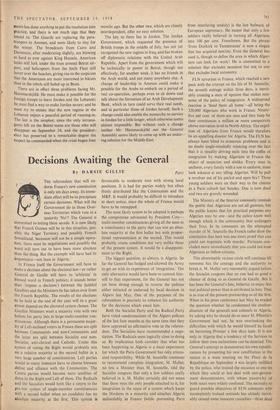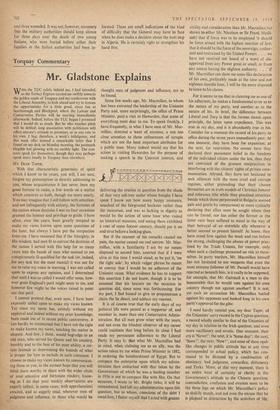Decisions Awaiting the General
In France itself the Government will have to make a decision about the electoral law—or rather General de Gaulle will have to 'arbitrate' (a blessed word in French politics; it sounds better than `impose a decision') between the faithful Gaullists and the Ministers he has taken over from the Fourth Republic. The results of the elections to be held at the end of the year will to a great extent depend on the electoral system chosen. The Gaullist Ministers want a majority, vote with two ballots for party lists in large multi-member con- stituencies. Although there is a permanent major- ity of Left-inclined voters in France these are split between Communists and non-Communists and the latter are split between Socialist and non- Socialist, anti-clerical and Catholic. Under this system of voting the Right would probably win on a relative majority at the second ballot in a very. large number of constituencies. Left parties Would in many instances have to choose between defeat and alliance with the Communists. The Centre parties would become mere satellites of those to the Right and Left of them. The Radicals and the Socialists would both like a return to the pre-war system of single-member constituencies with a second ballot when no candidate has an absolute majority at the first. This system is favourable to moderate men with strong local positions. It is bad for parties widely but often thinly distributed like the Communists and the MRP. It would probably be difficult to introduce at short notice, since the whole of France would have to be remapped.
The most likely system to be adopted is perhaps the compromise advocated • by President Coty- multi-member constituencies giving all the seats in a constituency to the party that can win an abso- lute majority at the first ballot but with propor- tional representation at the second. This would probably create conditions not very unlike those of the present system. It would be a disappoint- ment to the Right.
The biggest question, as always, is Algeria. So far the General has hedged and allowed the Army to get on with its experiment of 'integration.' The only alternative would have been to commit him- self to that experiment, for the General has not yet been strong enough to reverse the policies either initiated or endorsed by local decision in Algiers last May. One of the purposes of the referendum is precisely to enhance his authority for the decisions which await him.
Both the Socialist Party and the Radical Party have voted condemnations of the Algiers policies of the last four months at the same time that they have approved an affirmative vote in the referen- dum. The Socialists have recommended a nego- tiation. The Radicals seem logically close to doing so. By implication both consider that what has been happening in Algeria is a local experiment for which the Paris Government has only attenu- ated responsibility. While M. Soustelle continues to recommend complete integration, M. Mollet, no less a Minister than M. Soustelle, told the Socialist congress that only a few soldiers really believed in it. M. Mollet certainly did not mean that these were the only people attached to it, for integrdtion in the sense of a system which keeps the Moslems in a minority and attaches Algeria indissolubly to France (while preventing Paris from interfering unduly) is the last bulwark of European supremacy. He meant that only a few soldiers really believed in turning all Algerians into 100 per cent. Frenchmen. But the phrase `from Dunkirk to Tamanrasset' is now a slogan that has acquired sanctity. Even the General has used it, though to define the area in which Alger- ians can look for work ! He is committed to a solution that excludes secession but not to one that excludes local autonomy.
FLN terrorism in France, which reached a new peak with the attempt on the life of M. Soustelle, the seventh outrage within three days, is inevit- ably creating a state of opinion that makes non- sense of the policy of integration. A widespread reaction is 'Send them all home'—all being the 320,000 Algerians who work in France. Ninety- five per cent. of them are men and they keep by their remittances a million or more compatriots above starvation level in North Africa. The expul- sion of Algerians frOm France would therefore be an appalling disaster for Algeria. The FLN has always been blind to economic problems and is no doubt single-mindedly rejoicing over the fact that it is steadily driving nails into the coffin of integration by making Algerians in France the object of suspicion and dislike. Every man in uniform, every family with a son in uniform, must look askance at any idling Algerian. Will he pull a revolver out of his pocket and open fire? Three young soldiers were on their way to the cinema in a Paris suburb last Sunday. One is now dead and two are gravely wounded.
The Ministry of the Interior constantly reminds the public that Algerians are not all gunmen, but the public knows that for practical purposes any Algerian may be one—and the police know well enough which is the community that endangers their lives. In its comments on the attempted murder of M. Soustelle the French radio drew the conclusion that here was one more proof that you could not negotiate with murder. Parisians con- cluded more immediately that you could not treat Algerians as fellow-citizens.
This abominable vicious circle will continue till someone has the courage and the authority to break it. M. Mollet very reasonably argued before the Socialist congress that no one had as good a chance of doing so as General de Gaulle. But it has been the General's fate, hitherto, to enjoy less real political power than is attributed to him, That is as true of the present premiership as of the first. When in his press conference last May he evaded the question whether he condemned the insubor- dination of the generals and colonels in Algeria, by asking why he should do so since M. Pflimlin's Government had not, he was overlooking the difficulties with which he would himself be faced on becoming Premier a few days later. It is not only in Algeria that a tendency of the Services to follow their own inclinations can be detected. The General's attempt to demonstrate his own republi- canism by presenting his new constitution to the nation at a mass meeting on the Place de la Rdpublique on September 4 was largely nullified by the police, who treated the occasion as one on which they could at last deal with anti-goverm ment demonstrators, with whom passers-by of both sexes were widely confused. The necessity to guard possible objectives of FLN saboteurs with incompletely trained sentinels has already inevit- ably caused some innocent casualties—three dead and three wounded. It was not, however, necessary that the military authorities should keep silence for three days over the death of two young Italians, who were buried before either their families or the Italian authorities had been in- n- THE formed. These are small indications of the kind of difficulty that the General may have to face when he does make a decision about the next step in Algeria. He is certainly right to strengthen his hand first.



































 Previous page
Previous page